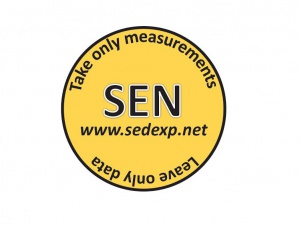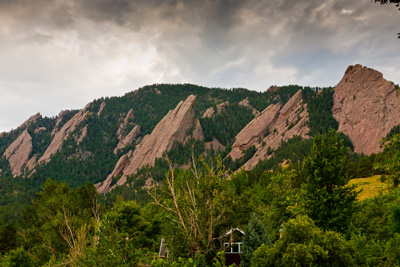Form:CSDMS annual meeting: Difference between revisions
No edit summary |
No edit summary |
||
| Line 39: | Line 39: | ||
=Objectives and general description= | =Objectives and general description= | ||
The joint CSDMS - SEN<sup>*</sup> 2016 annual meeting will focus on “advances in simulating the imprint of climate change on the land and seascapes, including the processes that influence them”. We would like presentations to either focus on the impacts of present and future climate change, or how climate change has impacted the earth in the past. Topics of interests also include modeling research that integrate different disciplines, different scales, and the synergy between models and experimental data. As in past meetings, keynote speakers are by invitation only, and poster presentations are the general media. | The joint CSDMS - SEN'''<sup>*</sup>''' 2016 annual meeting will focus on “advances in simulating the imprint of climate change on the land and seascapes, including the processes that influence them”. We would like presentations to either focus on the impacts of present and future climate change, or how climate change has impacted the earth in the past. Topics of interests also include modeling research that integrate different disciplines, different scales, and the synergy between models and experimental data. As in past meetings, keynote speakers are by invitation only, and poster presentations are the general media. | ||
The meeting will include: | The meeting will include: | ||
# ''State-of-the art keynote presentations'' in earth-surface dynamics and modeling | # ''State-of-the art keynote presentations'' in earth-surface dynamics and modeling | ||
| Line 199: | Line 199: | ||
<center>[[image:CSDMS_high_res_weblogo.jpg|300px]][[image:SEN-logo.jpeg|300px]]</center> | <center>[[image:CSDMS_high_res_weblogo.jpg|300px]][[image:SEN-logo.jpeg|300px]]</center> | ||
<sup>*</sup> | '''<sup>*</sup>)''' ''The Sediment Experimentalist Network (SEN) integrates the efforts of sediment experimentalists to build a knowledge base for guidance on best practices for data collection and management. The network facilitates cross-institutional collaborative experiments and communicates with the research community about data and metadata guidelines for sediment-based experiments. This effort aims to improve the efficiency and transparency of sedimentary research for field geologists and modelers as well as experimentalists.'' | ||
</noinclude><includeonly> | </noinclude><includeonly> | ||
{{{info|page name=Abstract 2015 CSDMS meeting-<unique number;start=001>}}} | {{{info|page name=Abstract 2015 CSDMS meeting-<unique number;start=001>}}} | ||
Revision as of 12:21, 6 January 2016
Capturing Climate Change
May 17 -19th 2016, Boulder Colorado, USA
Registration
Registration will open Mid January
Objectives and general description
The joint CSDMS - SEN* 2016 annual meeting will focus on “advances in simulating the imprint of climate change on the land and seascapes, including the processes that influence them”. We would like presentations to either focus on the impacts of present and future climate change, or how climate change has impacted the earth in the past. Topics of interests also include modeling research that integrate different disciplines, different scales, and the synergy between models and experimental data. As in past meetings, keynote speakers are by invitation only, and poster presentations are the general media. The meeting will include:
- State-of-the art keynote presentations in earth-surface dynamics and modeling
- Hands-on clinics related to community models, tools and approaches
- Transformative software products and approaches designed to be accessible, easy to use, and relevant
- Breakout sessions for Working, Focus Research Groups and the Initiatives
- Poster Sessions
and more!
Poster Information: The poster boards are configured for 4' wide by 6' tall (portrait orientation) posters. The deadline to submit abstracts is April 15, 2016.
Agenda
Click here to view the draft agenda of 12/29/2015.
Participants
Interested to see who registered for the meeting as of 05/18/2024?
Reimbursement
Within its budget, CSDMS intends to support member applicants to attend the annual meeting. Towards this goal, we encourage members to fully or partially cover their expenses if capable. We additionally thank those in the industry and agency fields for understanding that 1) we cannot compensate federal agency participants since our own funding is from NSF, and 2) we request that our industrial/ corporate participants cover their own costs thereby allowing more academic participants to attend.
To the extent possible, CSDMS intends to reimburse the registration fee, lodging (shared rooms at 100% and single rooms at 50% at conference hotels), and a limited amount of travel expenses for qualified registrants - those members who will attend all three days of the meeting and are not industry or federal employees.
Important for foreign travelers requesting reimbursement: If you need a visa to travel to USA, select a business visa. If you need an invitation letter, please email csdms@colorado.edu as soon as possible. Also indicate whether specific wording is required in the letter. Second, we will need to copy the entry stamp in your passport sometime during the meeting as proof that you were here on business as required by US tax laws for reimbursement (especially when dealing with airfare.) We are only able to provide reimbursement for airfare within the U.S. All airfare that is being reimbursed must be for airlines that are U.S. flag carriers.
Travel, Lodging and Conference Center Information
The meeting will be held at SEEC
Hotels: Millennium Harvest House Hotel and the Boulder Inn by Best Western
Transportation:
You can book transportation between DIA and Boulder here: Green Ride Boulder. And information on how to find Green Ride Boulder at DIA.
We will provide a bus between the hotels and the meeting venue each day. We will also provide transportation to the banquet.
Student Scholarships
This year CSDMS is offering a limited number of scholarships (up to 12) for graduate students to attend the CSDMS annual meeting. Three scholarships will be offered for the purpose of increasing participation of underrepresented students. To be eligible, graduate students need to meet the following requirements:
- Attend the whole meeting (May 17-19, 2016)
- Submit an abstract
- Be enrolled as a graduate student at the time of the meeting (bring proof)
- Submit a letter of motivation that states why you wish to participate in the meeting, and explain how your participation would enhance diversity in the field of surface dynamics modeling.
The CSDMS scholarships will cover:
- Registration costs
- Travel (air fare ONLY within the United States and local transport)
- Per diem to help reimburse the cost of meals from 17-19 May 2016 not offered in the conference schedule
Important dates
- January 15th: Registration opens
- March 1st: Deadline for student scholarship applications
- April 1st: Deadline for abstract submission & registration
- May 17-19th: CSDMS annual meeting
- May 20th: CSDMS Executive and Steering committees meeting (by invitation only)


*) The Sediment Experimentalist Network (SEN) integrates the efforts of sediment experimentalists to build a knowledge base for guidance on best practices for data collection and management. The network facilitates cross-institutional collaborative experiments and communicates with the research community about data and metadata guidelines for sediment-based experiments. This effort aims to improve the efficiency and transparency of sedimentary research for field geologists and modelers as well as experimentalists.

